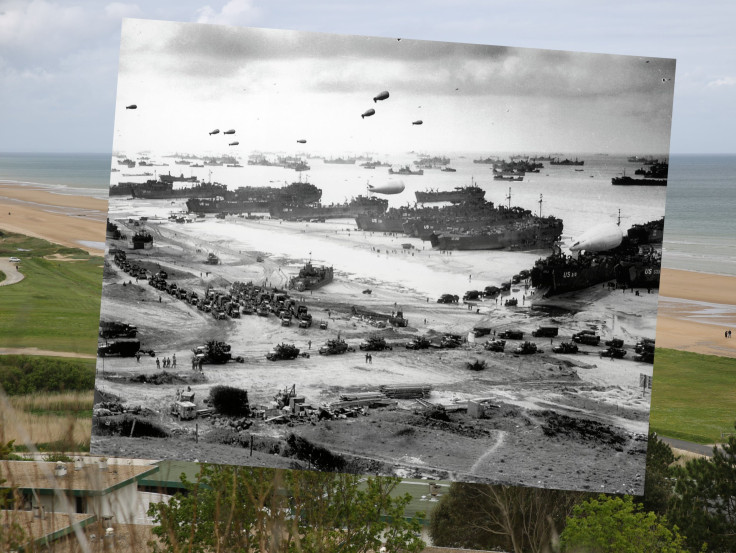D-Day Anniversary 2016: Quotes And Facts About The 1944 Allied Invasion Of Normandy

Monday marks 72 years since D-Day, the pivotal World War II operation that was the final push to break Nazi Germany's stronghold on Europe. More than 160,000 Allied soldiers pulled off the biggest amphibious invasion ever when they landed on the beach in Normandy, France, storming the shores in an operation that left then-Gen. Dwight D. Eisenhower telling countries across the continent: "The hour of your liberation is approaching."
"It is hard to conceive the epic scope of this decisive battle that foreshadowed the end of Hitler's dream of Nazi domination," the National D-Day Memorial in Bedford, Virginia, writes on its website. "After years of meticulous planning and seemingly endless training, for the Allied forces, it all came down to this: The boat ramp goes down, then jump, swim, run and crawl to the cliffs."
The operation behind D-Day, called Overlord, was initially scheduled for June 5, 1944, but bad weather pushed it back. Eisenhower, who was commanding the troops, eventually sent more than 5,000 ships and 11,000 airplanes to France when the skies cleared. They were primarily American, British and Canadian.
The shoreline was divided into sections: Omaha, Gold, Juno, Sword and Utah. Soldiers had to carry as much as 75 pounds' worth of supplies for themselves and citizens they came across, including their weapons and ammunition, matches, sea sickness pills, books, condoms, candy bars and cigarettes, according to the National World War II Museum.
They descended on the beaches at 6:30 a.m. local time June 6, 1944, and began to lay siege to heavily fortified positions. On Utah Beach, several tanks and other vehicles sank before reaching shore, but three hours into the invasion the Allies had taken control of three of the beach's exits. By nightfall, they'd lost 200 men but were firmly in France, according to the museum.
On Omaha Beach, many more vehicles sank such that there was a buildup on the attack approach. Navy ships moved in to fight off the Nazis while the troops traveled about a mile inland. More than 2,000 people died in the fierce battle.
The Sword, Juno and Gold beach operations encountered similar complications, but together, the soldiers made progress in weakening the Nazis' hold on Europe.
Troops and world leaders everywhere have spoken at length about D-Day in the past 72 years. Here are a few of their quotes, collected from GoodReads, USA Today and the museum:
“This operation is not being planned with any alternatives. This operation is planned as a victory, and that’s the way it’s going to be. We’re going down there, and we’re throwing everything we have into it, and we’re going to make it a success.” — Eisenhower
"As our boat touched sand and the ramp went down, I became a visitor to hell. I shut everything out and concentrated on following the men in front of me down the ramp and into the water." — Pfc. Harry Parley
"This vast operation is undoubtedly the most complicated and difficult that has ever occurred.'' — Winston Churchill
“Lieutenant Welsh remembered walking around among the sleeping men, and thinking to himself that 'they had looked at and smelled death all around them all day but never even dreamed of applying the term to themselves. They hadn't come here to fear. They hadn't come to die. They had come to win.” ― Stephen E. Ambrose
"It was unknowable then, but so much of the progress that would define the 20th century ... came down to a battle for a slice of beach only 6 miles long and 2 miles wide." — U.S. President Barack Obama
"I crawled in over wounded and dead, but I couldn't tell who was who, and we had orders not to stop for anyone on the edge of the beach, to keep going or we would be hit ourselves. ... I ran into a bunch of my buddies from the company. Most of them didn't even have a rifle. Some bummed cigarettes off of me. ... The Germans could have swept us away with brooms if they knew how few we were and what condition we were in." — Pvt. Charles Thomas
"That road to V-E Day was hard and long, and traveled by weary and valiant men. And history will always record where that road began. It began here, with the first footprints on the beaches of Normandy." — President George W. Bush
"For these men are lately drawn from the ways of peace. They fight not for the lust of conquest. They fight to end conquest. They fight to liberate.” — President Franklin Roosevelt
"The first night in France I spent in a ditch beside a hedgerow wrapped in a damp shelter-half and thoroughly exhausted. But I felt elated. It had been the greatest experience of my life. I was 10 feet tall. No matter what happened, I had made it off the beach and reached the high ground. I was king of the hill, at least in my own mind, for a moment." — Sgt. John Ellery
© Copyright IBTimes 2024. All rights reserved.






















